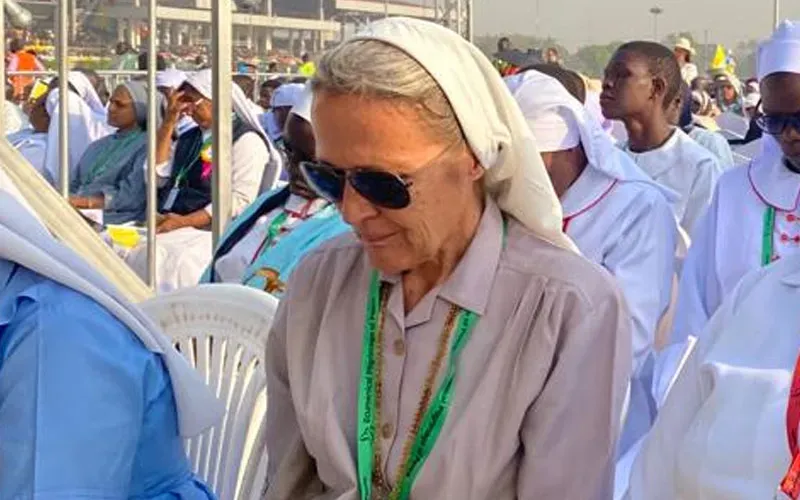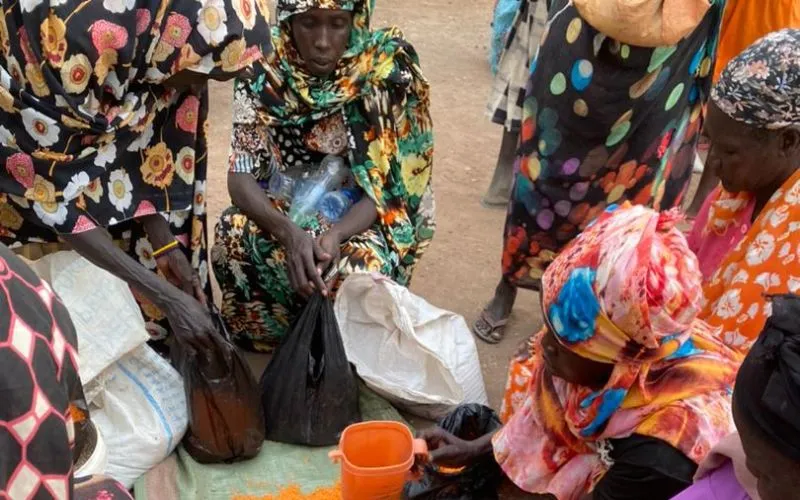Due to extensive fighting, at least one-third of the population is displaced, and nearly half the population – 25 million people – need humanitarian assistance. In Darfur, mass killings and displacement have led to reports of ethnic violence.
In the April 14 interview, Sr. Balatti told ACI Africa that over 600,000 people have crossed over to South Sudan, thereby putting pressure on the East-Central African country that is still recovering from years of instability owing to its civil war.
Sr. Balatti operates from the Caritas office of Malakal Diocese. Malakal is the headquarters of the Upper Nile State, one of the border States neighbouring Sudan. The Upper Nile State has the cross-border point of Joda. This is one of the areas where more people fleeing the conflict in Sudan have crossed, fleeing violence and looking for better means to survive.
 Returnees travelling back from South Kordofan in Sudan to South Sudan. Credit: Sr. Elena Balatti
Returnees travelling back from South Kordofan in Sudan to South Sudan. Credit: Sr. Elena Balatti
“Upper Nile State from where I am speaking is one of the areas where the influx of refugees has been more massive,” she says, adding that South Sudan has been heavily affected by the sudden influx of refugees.
(Story continues below)
Additionally, climate change has caused massive flooding in various parts of South Sudan, stripping people of their sources of livelihood. The Caritas official says the flooding has led to a critical humanitarian situation in affected regions, including the Upper Nile region where the returnees are transiting.
South Sudan depends 90 percent on its oil, exported through Sudan, Sr. Balatti says, and adds, “As things stand now, we don’t know the future of this trade.”
The pipelines carrying South Sudanese oil run through the Upper Nile and Unity States, and across the border to the port in Sudan.
Sr. Balatti tells ACI Africa that it has been over a month since reports emerged that the pipelines needed maintenance. The pipelines have not been looked into because they pass through areas of conflict in Sudan, she says.
“We understand that Sudan’s temporary government declared that they can’t guarantee the flow of oil from South Sudan through Sudan and to the port for export. This means that South Sudan’s major source of income is threatened,” the CMS member says, adding that oil flow is stopping, and the people can already feel the pinch of the skyrocketing fuel prices.
At the transit camp in Malakal, the humanitarian situation is dire. Many of the returnees transiting through Malakal come from Khartoum or Aljazeera State.
Sr. Balatti explains that when the Sudanese conflict erupted there, the people needed to sell their properties and travel light since transport was very expensive.
Most of the returnees were leading comfortable lives in Sudan. But they had to sell all their belongings and spend most of the money they had on the journey.
According to Sr. Balatti, those returning to South Sudan cross the border with nothing and arrive in South Sudan exhausted from their long journey of tough conditions.
The returnees share depressing testimonies about their near-death experiences in Sudan, the Catholic Sister says, and adds, “Others share that they had to leave when living conditions became unbearable and they couldn’t get the basics for survival. Food has become scarce in the market. There is no schooling for their children.”
Several South Sudanese returning tell the Caritas official that this is the second time they are fleeing violence. They say that they went to Sudan seeking to rebuild their lives after the 2013-2018 civil war in which most of them lost their loved ones.
 Credit: Sr. Elena Balatti
Credit: Sr. Elena Balatti
Sr. Balatti tells ACI Africa that South Sudan has implemented a policy that requires the returnees to proceed to their respective ancestral homes and not to stay in the transit camps for long.
The Italian-born Nun visits the homes of the returnees and observes their attempts to start life fresh.
“The humanitarian situation in their homes is dire,” she says, and explains, “Some come back to empty homes without a way to restart their lives. We try to help them resettle by putting up temporary structures for them and giving them food. Some of the people try to get vegetables growing on riverbanks. Parents are also crumbling for positions for their children in school.”
As fighting in Sudan enters its second year, Sr. Balatti expresses fear that suffering will be prolonged and become worse. In Sudan and South Sudan, the protracted civil war “is bound to create some serious refugee problems,” the Catholic Nun says.
“We fear for how the conflict may evolve,” she further says, and continues, “We hope for fruitful negotiations, for the parties involved to be willing to compromise for the sake of peace. They have to find a way to talk about their disagreement, address the issues that provoked this conflict.”
Agnes Aineah is a Kenyan journalist with a background in digital and newspaper reporting. She holds a Master of Arts in Digital Journalism from the Aga Khan University, Graduate School of Media and Communications and a Bachelor's Degree in Linguistics, Media and Communications from Kenya's Moi University. Agnes currently serves as a journalist for ACI Africa.
 Sr. Elena Balatti. Credit: ACI Africa
Sr. Elena Balatti. Credit: ACI Africa




 Returnees travelling back from South Kordofan in Sudan to South Sudan.
Returnees travelling back from South Kordofan in Sudan to South Sudan.  Credit: Sr. Elena Balatti
Credit: Sr. Elena Balatti


